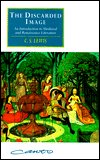So I finally finished this one.

The Discarded Image, by CS Lewis. An Introduction to Medieval and Renaissance Literature.
This was one of the last books Lewis wrote, and few people know he was a literary critic by trade, not a theologian.
I didn't understand 80% of the literary references to Medieval works, because I'm not all that well-read in the stuff. But I could usually infer the main points. Here are a couple highlights:
"If you had asked... Chaucer 'Why do you not make up a brand-new story of your own?' I think they might have replied (in effect) 'Surely we are not yet reduced to that?' Spin something out of one's own head when the world teems with so many noble deeds, wholesome examples, pitiful tragedies, strange adventures, and merry jests which have never yet been set forth quite so well as they deserve?... Why make things for oneself... when there [are] riches all about you to be had for the taking? The modern artist often does not think the riches [are] there" (pg 211).
"Between Chaucer's time and [Alexander Pope's] the arts had become conscious of what is now regarded as their true status. Since his time they have become even more so. One almost foresees the day when they may be conscious of little else.... A chef, a surgeon, or a scholar, may be proud, even to arrogance, of his skill; but his skill is confessedly the means to an end beyond itself, and the status of the skill depends wholly on the dignity or necessity of that end... Literature exists to teach what is useful, to honour what deserves honour, to appreciate what is delightful."
No comments:
Post a Comment